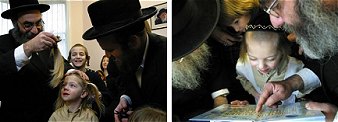|
|
|||||||||||||||||||||
 |
|||||||||||||||||||||
|
Learn Hebrew |
|||||||||||||||||||||
|
|
|
|
U
Ulpan Unleavened Bread (Feast of) (khag ham-matz-TZOHT) n. Feast of Unleavened Bread. Directly following Passover is Chag HaMatzot, or the Festival of Unleavened Bread, when no chametz may be eaten or possessed for a full seven days. Since the Jewish calendar reckons the start of a day at evening, it is sometimes confusing determining when a festival begins and ends. For example, Passover begins on Nisan 14 at evening, that is, between 3:00 pm to sundown, and continues through Nisan 15. Strictly speaking, then, Passover begins on Nisan 14th and ends on Nisan 15th. In Exodus chapter 12:15-20 God instructed the Jews to eat unleavened bread for seven days, from Nisan 14th at evening until Nisan 21 at evening, but in Leviticus 23:6 the seven day festival of Unleavened Bread is said to begin on Nisan 15, following Passover, and therefore would end on Nisan 22. This apparent inconsistency is reconciled once we understand that the new day begins at sundown, that is, when the end of one day and the start of a new day both occur. The Festival of Unleavened Bread, then, begins on the 15th of Nisan, which is also a High Sabbath day, and ends on Nisan 22. Chag HaMatzot represents a holy week spent without leaven in our lives, a picture of our response to the redemption of the LORD (Matthew 16:12; Mark 8:14-15; Luke 12:1; Romans 6:13-22; 1 Corinthians 5:6-8). Note that in modern Judaism, Passover and Chag HaMatzot are collectively considered as a single holiday, usually referred together as "Passover." Upsherin (oop-she-reen) Yiddish: lit. "shear off" is a Jewish haircutting ceremony held when a boy is three years old (the custom is first mentioned by Chaim Vital, a student of the 16th century Kabbalist, the Arizal). Upsherin comes from a Kabbalistic interpretation of Leviticus 19:23, where the law that one is not permitted to eat the fruit that grows on a tree for the first three years is given (called orla). This idea is applied to cutting a child's hair. Among the Chasidic community, upsherin marks a boy's entry into the commencement of Torah study. A kippah (yarmulke) and tzitzits can now be worn and the boy will be taught to read the Hebrew alphabet.  Uriah (oo-ree-YAH) Uriah. The Hittite husband of Bathsheba who was murdered by conspiracy of King David and Joab, his field commander. Uriah means "Jehovah (Yahweh) is my light (flame)." Urim and Thummim (oo-REEM ve-too-MEEM) n. "Lights and perfections." The sacred breastplate of the high priest (choshen) was worn over the ephod (linen apron) containing two special gemstones (Ex. 28:30; Lev. 8:8; Num. 27:21; Deut. 33:8;). These were used to discern the will of God in some cases (1 Sam. 14:41; 28:6; Ezr. 2:63; Neh. 7:65). Some have claimed that the Shekhinah would cause the Urim and Tummim to light up in varying patterns to reveal His decision, though it might be that the stones represented "Yes/No" (a sacred lot) when consulted. Ushpizin (oosh-pee-ZEEN) n. Aramaic. Ushpizin, "guests." According to Jewish mystical tradition, during Sukkot the souls of the "seven shepherds of Israel" (Abraham, Isaac, Jacob, Moses, Aaron, Joseph, and King David) leave the Garden of Eden (thought to be the abode of the righteous dead) to visit earthly Sukkot celebrations (Zohar - Emor 103a). Collectively these transcendent guests are known as Ushpizin, an Aramaic word meaning "guests." Each day of Sukkot, a different "guest" is thought to be dispatched from heaven. To welcome them, some Ultra Orthodox offer a formal invitation for their arrival while others set aside a chair reserved for them.  Note: The fun of the brilliant movie Ushpizin is that the guests who visit are sometimes not whom we might expect, and that leads to comedy, pathos, and a strong expression of faith. This is a classic "fable" of hakhnasat orekhim (hospitality to guests) straight from the Jewish heart. Recommended! |
||||||||||||||
|
Hebrew for Christians |
||||||||||||||
|
||||||||||||||